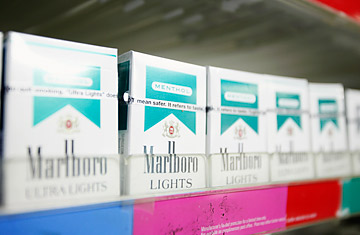
(2 of 2)
Opponents of higher levies on tobacco warn that sin taxes are regressive and hit poor folks the hardest. They also claim that the low taxes are a boon for the state because bargain-hunting residents of the eight states bordering Missouri cross state lines to stock up on coffin nails. For example, a smoker in Keokuk, Iowa, could save nearly $12 per carton in state taxes by driving a little ways to Kahoka, Mo. The distance between Mammoth Springs, Ark., and Thayer, Mo., is about 2½ miles (4 km) — and $10 a carton in taxes.
"The antitobacco zealots are not trying to reasonably regulate," says Ronald J. Leone of the Missouri Petroleum Marketers & Convenience Store Association. "Their goal is prohibition. It's hard to negotiate with these people. They can't prohibit it, so they're trying to kill it by a thousand cuts."
Look at the whole tax picture, Leone contends. The federal tax on a pack of cigarettes is $1.01, and local communities impose their own levies. When federal, state and local taxes are tallied up, Missouri's smokers are paying 46% taxes on a pack of popular off-brands, with names like Decade and Xcaliber, he said, while brand names are taxed above 30%, depending on the locality. "There is no other product on the market that's overtaxed like that," says Leone.
Missouri's beer tax, too, is near the bottom. Its six cents-per-gal. rate has not been touched in nearly 40 years. The storied Anheuser-Busch brewery in St. Louis is one of the state's largest employers, which has surely helped keep the status quo in place.
Yet much of Missouri's steadfast refusal to jack up sin taxes can be attributed to one man. For decades, Jefferson City's most revered and feared lobbyist was John Britton, who worked to protect both Big Tobacco and the brewery interests. Stately and charming, Britton is a three-pack-a-day smoker so beloved at the statehouse that the Senate passed a resolution 15 years ago forever declaring the airspace immediately surrounding him "an official Missouri state senate designated smoking area."
And his hold has extended to other alcohol and cigarette regulations. It's perfectly legal to have open containers of alcohol in moving cars in Missouri, for instance. Britton's argument against the open-container bans embraced by most other states was that holding a beer can is no more distracting than holding a peanut-butter sandwich. When that brand of homespun thinking doesn't work, Britton has been known to hint that Missouri can kiss Budweiser goodbye — and all those jobs and corporate dollars — should the legislature decide to play nanny.
That would be a new role for Missouri politicians. The state has a long history of tolerance when it comes to matters of appetite. During the long years of Prohibition, as America's reformers fought to dry out the nation, Missouri remained as wet as the rain forest. Boss Tom Pendergast of Kansas City made sure the saloons were well stocked, and not one felony prosecution for bootlegging occurred in his district. "If you want to see some sin, forget about Paris. Go to Kansas City," opined the Omaha World Herald at the time.
Still, it's politics, played hard and fast in Missouri, that might conceivably inspire a hike in the tobacco tax. Some supporters of higher cigarette levies have begun to suggest that that this might be a good chance for Republicans to put Governor Nixon in a box. Suppose the legislature passed a cigarette tax to ward off school budget cuts and sent it for the governor's signature: Nixon would have to choose between breaking his no-tax pledge or leaving schools in the lurch. That "would be a real Jedi mind trick on the governor," muses one observer — the sort of crafty political maneuver that might leave a Missouri pol craving another cigarette.
